
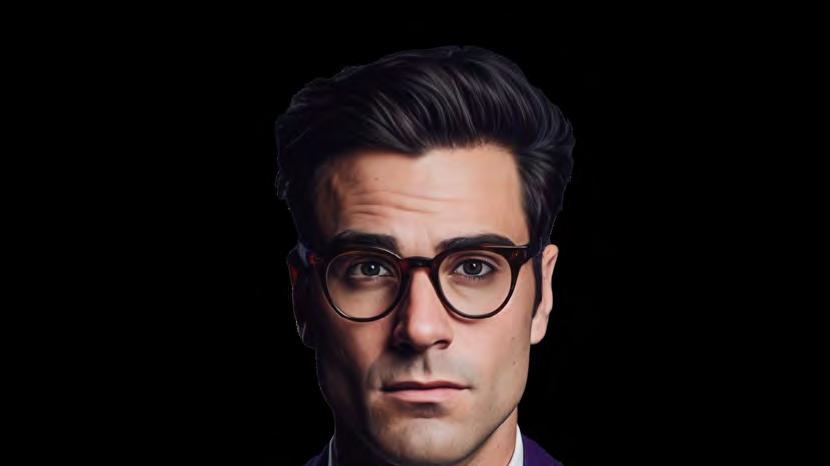
The LGBTQ+ locals choice Volume 24 #1 FabLasVegas.com Exclusive Interview DAN LEVY From ‘Schitt’s Creek’ to ‘Good Grief’ + CHARLIES LAS VEGAS CLOSES
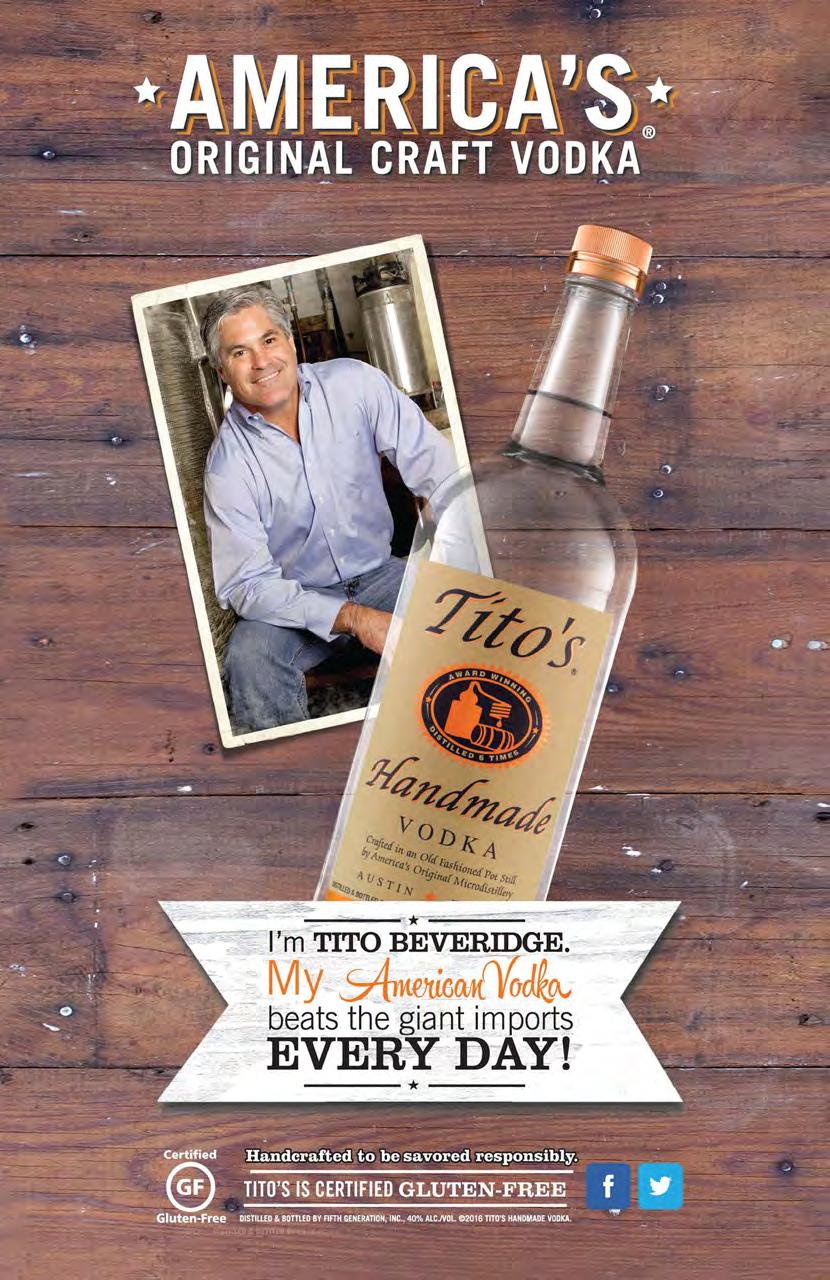
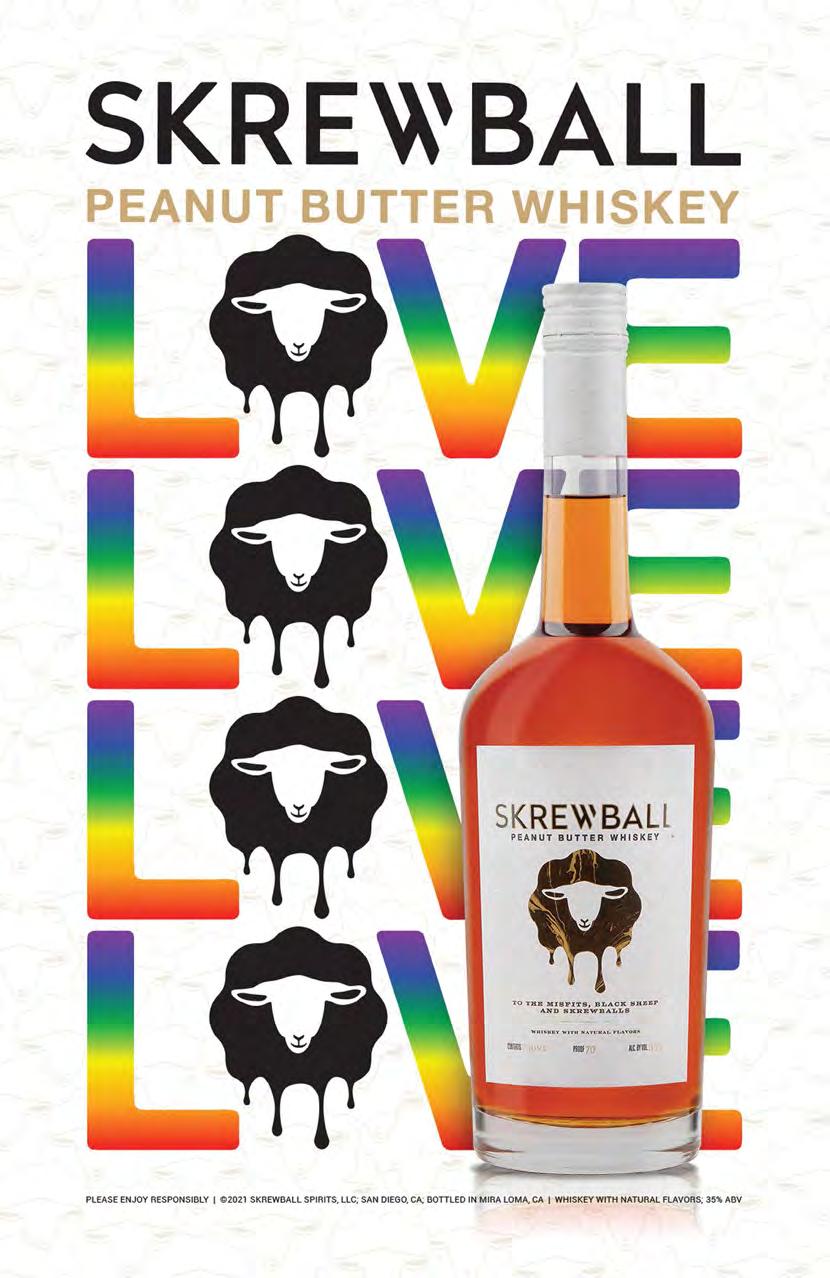
We extend our heartfelt appreciation to the exceptional individuals who form the backbone of Fab, shaping it into the dynamic platform it is today. Leading the charge is Editor-in-Chief Maria Carlson, whose editorial prowess sets the standard for excellence. Alongside her, Creative Director Tara Dale infuses every facet with innovative vision, while Managing Editor Mildred Bard ensures seamless coordination. Art Director Carrie Rad adds an aesthetic brilliance, complemented by the insightful contributions of our fabulous writers.
Behind the lens, Georgio Barrios skillfully guides our photography team, capturing the essence of our stories with finesse. A special accolade goes to our advertising team, spearheaded by Director of Sales and Marketing, Peter Ryan, whose strategic finesse has played a pivotal role in our success.
Our gratitude extends to both our outstanding team and our valued readers and subscribers. Your support has been instrumental in shaping Fab into the vibrant platform it is today. For those interested in advertising opportunities, connect with us at info@bmgus.com or call 702-907-0605. Embark on a journey of creativity and innovation with Fab – where collaboration promises mutual success.

4 Fab Vegas 26 GayVegas.com YEARS Vegas’ #1 travel site for LGBTQ+ @GayVegas #GayVegas www.EqualityNevada.org info@EQNV.org
and
Nevadans and
™
To secure equal rights
protections for LGBTQ
their families.
Bundle Media Group Inc. MAGAZINE

LGBTQ+ VEGAS NEWS
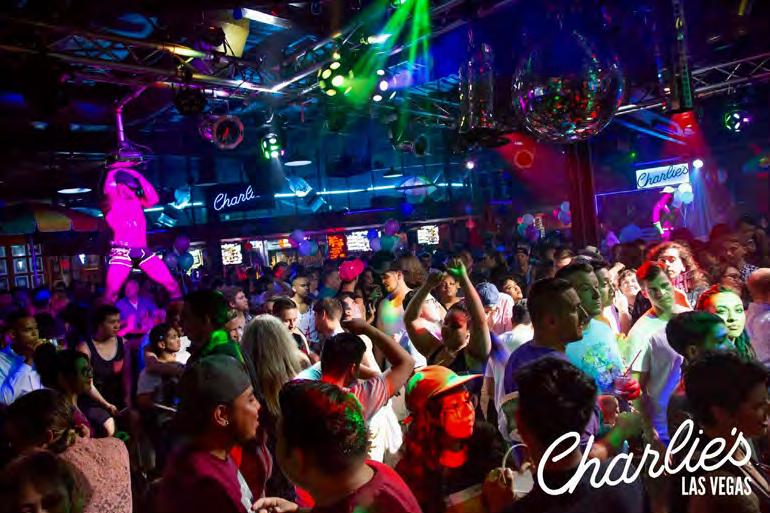
Farewell to an Icon: Remembering Charlie’s Las Vegas and Its Enduring Legacy in LGBTQ+ History
In a city known for its dazzling lights and vibrant nightlife, the closure of Charlie’s Las Vegas marks the end of an era for the LGBTQ+ community in Southern Nevada. With its final night on January 31, 2024, the iconic nightclub and bar took its last bow, leaving behind a legacy that spans decades of celebration, acceptance, and camaraderie.
A Legacy of Inclusivity: The Origins of Charlie’s
The story of Charlie’s begins in the early 1980s when founder John King set out to create a space where members of
the LGBTQ+ community could come together and be themselves without fear of judgment or discrimination. Born and raised in Colorado, King was no stranger to the challenges faced by queer individuals in conservative environments. However, his unwavering commitment to fostering a sense of belonging led him to open the first Charlie’s location in Denver in 1981.
From its humble beginnings as a small country-themed bar, Charlie’s quickly became a beloved fixture in the local LGBTQ+ scene, drawing crowds with its lively
atmosphere and welcoming ambiance. The success of the Denver location inspired King to expand his vision, and in the years that followed, Charlie’s would find new homes in Phoenix, Chicago, and even Puerto Vallarta, Mexico.
A Journey of Adaptation: Relocations and Resilience
Despite the challenges of navigating different markets and climates, King’s determination to provide a space for LGBTQ+ individuals remained steadfast. Each relocation presented its own
6 Fab Vegas
----------------------------------------------------------------------------------------------------------------------------------------------
Photo Credit: Facebook.com/CharliesLasVegas
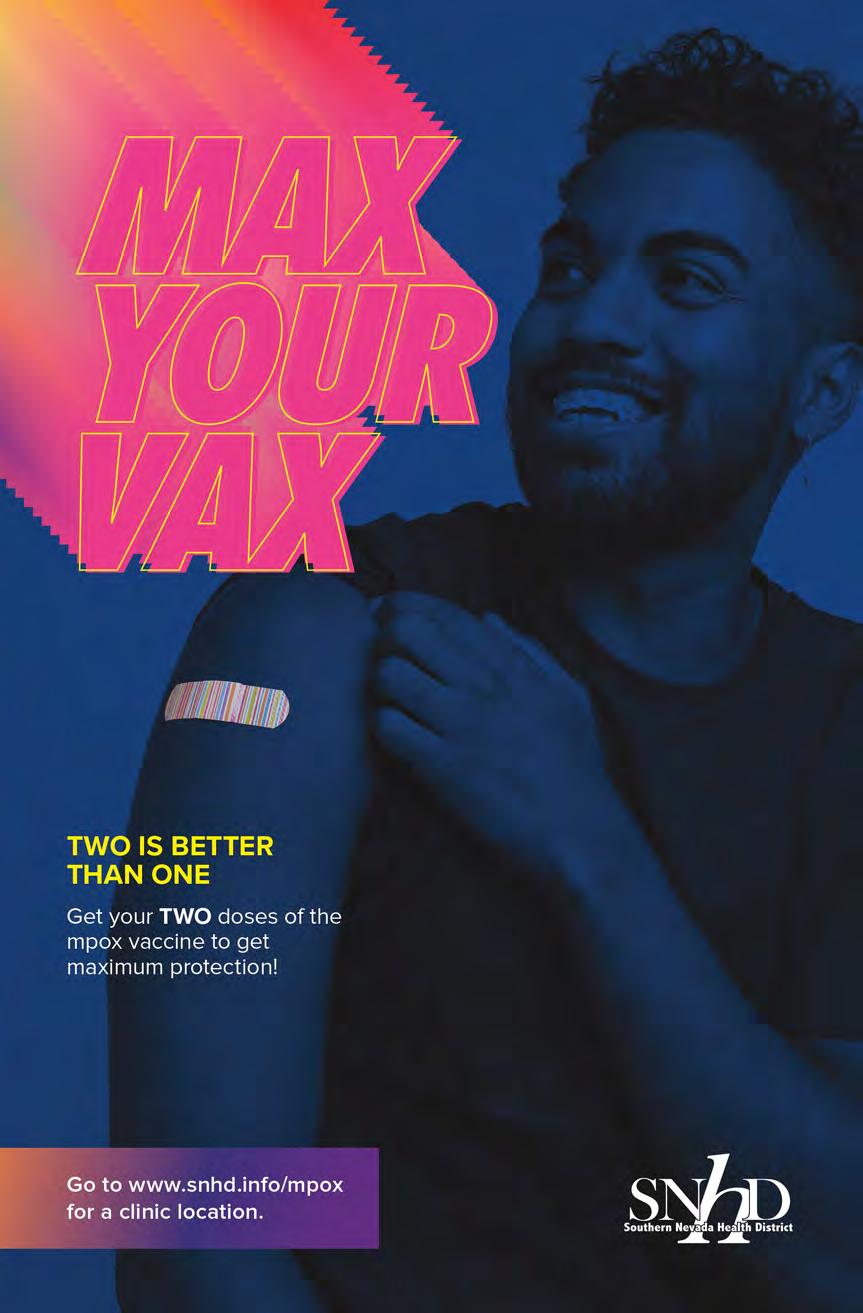
LGBTQ+ VEGAS NEWS
set of opportunities and obstacles, from building a new customer base to adapting to local cultural norms. Yet, through it all, Charlie’s remained a beacon of inclusivity and acceptance, attracting patrons from all walks of life.
In Denver, Charlie’s became synonymous with the city’s burgeoning LGBTQ+ community, hosting drag shows, line dancing nights, and charity events that brought people together in celebration. The Phoenix location, nestled in the city’s Melrose District, became a hotspot for two-stepping and Sunday fundays on the patio, while Chicago’s North Halsted Street welcomed Charlie’s with open arms, solidifying its reputation as a premier destination for LGBTQ+ nightlife in the Windy City.
A Commitment to
Community: John King and the International Gay Rodeo Association
Throughout his journey as a nightclub owner, John King remained deeply connected to his roots in the LGBTQ+ community, serving as a trailblazer and advocate for change. In addition to his work with Charlie’s, King played a pivotal role in the founding of the International Gay Rodeo Association (IGRA) in 1984, alongside fellow pioneers Al Bell, Terry Clark, and Wayne Jakino. In a candid interview with “Voices of Gay Rodeo,” King reflected on his experiences
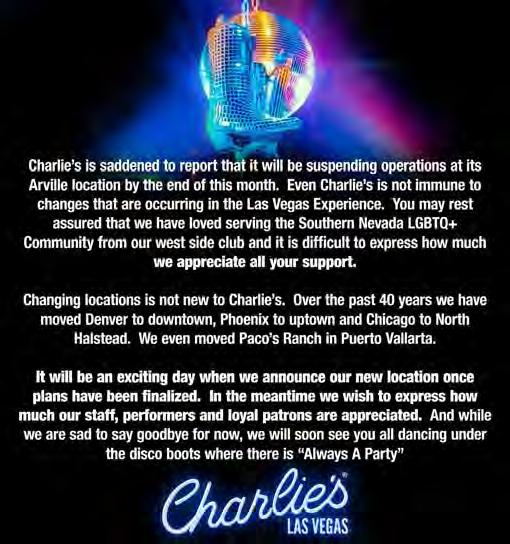
within IGRA and the impact of LGBTQ+ rodeo on his life. From the early days of organizing conventions and setting up rules for competition to his tenure as chairman of the board of trustees, King’s contributions to the organization were instrumental in shaping its trajectory and fostering a sense of camaraderie among its members.
Facing the Future: Challenges and Closure
As the years passed and the landscape of LGBTQ+ nightlife evolved, Charlie’s Las Vegas found itself facing new challenges. Changes in the Las Vegas experience, coupled with major traffic diversions
surrounding the venue’s Arville location, ultimately led to the difficult decision to suspend operations at the end of January 2024. Despite the sadness of saying goodbye to the Arville location, King expressed optimism for the future, emphasizing the resilience of Charlie’s and its commitment to serving the LGBTQ+ community.
Originally opening its doors in 2005, Charlie’s Las Vegas quickly became a staple in the local LGBTQ+ scene, offering a welcoming space for individuals from all walks of life to come together, celebrate, and express themselves freely. The venue, located on Arville Street, served as a hub for entertainment, featuring drag
8 Fab Vegas
-------------------------------------------------------------------------------------------------------------------------------------------------------------------------------------------------------------------------------------------------------------------------------------------
Photo Credit: Facebook.com/CharliesLasVegas

LGBTQ+ VEGAS NEWS
shows, themed parties, and lively dance floors that kept patrons coming back for more.
The announcement of the closure came on January 15th, when Charlie’s posted a heartfelt message on its social media pages, expressing gratitude to the Southern Nevada LGBTQ+ community for their unwavering support over the years. The statement cited changes in the Las Vegas experience as a contributing factor to the decision to suspend operations at the Arville location.
“Charlie’s is saddened to report that it will be suspending operations at its Arville location by the end of this month. Even Charlie’s is not immune to changes that are occurring in the Las Vegas Experience. You may rest assured that we have loved serving the Southern Nevada LGBTQ+ Community from our west side club and it is difficult to express how much we appreciate all your support. Changing locations is not new to Charlie’s. Over the past 40 years we have movedDenver to downtown, Phoenix to uptown and Chicago to North Halstead. We even moved Paco’s Ranch in Puerto Vallarta. It will be an exciting day when we announce our new location once plans have been finalized. In the meantime we wish to express how much our staff, performers and loyal patrons are appreciated. And while we are sad to say goodbye for now, we will soon see you all dancing under the disco
boots where there is “Always A Party” —-CHARLIES LAS VEGAS!”
Honoring a Legacy:
As patrons bid farewell to Charlie’s Las Vegas, they do so with a sense of gratitude for the memories created within its walls. From drag shows and themed parties to moments of connection and camaraderie, Charlie’s leaves behind a legacy that will be cherished for years to come. While the future location of Charlie’s remains uncertain, one thing is for certain: its spirit of inclusivity and acceptance will endure, serving as a beacon of
hope for LGBTQ+ individuals everywhere.
In conclusion, the closure of Charlie’s Las Vegas marks the end of an era, but it also signals the beginning of a new chapter in LGBTQ+ history. As we reflect on the impact of Charlie’s and its founder, John King, let us honor their legacy and continue the fight for equality, acceptance, and love for all.


10 Fab Vegas -------------------------------------------------------------------------------------------------------------------------------------------------------------------------------------------------------------------------------------------------------------------------------------------


Dan Levy Talks Grief and the Importance of Chosen Family
The ‘Schitt’s Creek’ creator plays a grieving husband in his directorial film debut, ‘Good Grief’
By: Chris Azzopardi

The grief was very real for Dan Levy, who lost his grandma and rescue dog, Redmond, over the span of a couple of years during the pandemic. And then he did something very Dan Levy with that grief — he opened
a blank page and got to work on “Good Grief,” a Netflix film, out now, that he wrote, directed and stars in.
The film is the “Schitt’s Creek” creator’s first major endeavor after his Emmy-winning show became a sleeper hit as the
world shut down due to the Covid pandemic when we sheltered in place (in front of our TVs). In “Good Grief,” Levy plays Marc, an artist we meet at a Christmas party that ends tragically for his
12 Fab Vegas CELEBRITY INTERVIEW -------------------------------------------------------------------------------------------------------------------------------------------------------------------------------------------------------------------------------------------------------------------------------------------
Photo Credit: Netflix
husband, Oliver (Luke Evans), who dies in a car accident right outside their place. Marc is left trying to make sense of his sudden loss and what he didn’t know about Oliver’s life before it ended, which takes him to a secret flat Oliver had in Paris. With Marc on his unexpected journey to healing his shattered self are his dearest friends, Sophie (Ruth Negga) and Thomas (Himesh Patel).
I recently spoke with Levy about the film, which he sees as an opportunity to flex new creative muscles, including his portrayal of a character who may be as stylish as David Rose even if he isn’t him, exactly.
It’s nice to have you back in regular conversation, Dan. It’s been a few years. The world was on a real Dan Levy kick for a while.
[Laughs.] I think it’s nice to take a break. It’s nice for everyone to take a break. You don’t want to ever overstay your welcome. So I’m happy that there’s something that I care about that I’m able to talk about now.
What goes through your mind when something that is so personal to you gets its wings and is released into the world?
Well, it’s tough because it’s done. And I care deeply about it, and that’s all that really kind of matters to me outside of the viewers that watch it and hopefully find some point of connectivity in it. It’s always a very sort of awkward thing to
kind of have to sell your work. But I’m really happy with it and it’s a movie that I know that I would like to watch and one that speaks to my life right now in a way that I feel is quite truthful. And yeah, it’s a weird thing to put it out there and then have people do what they will with it.
But at the end of the day, I’m grateful for the opportunity, ultimately. It’s a 180 from what people have come to know me from. And those opportunities don’t get handed out all the time. So I was really grateful that some people over at Netflix were willing to go in this new direction with me. And yeah, I’m just glad that there’s a movie out there that speaks to my life in a meaningful way, that speaks to friendship and found family and the fact that, for a lot of people out there who are without kids and without partners, that friendships are the great loves of our lives.
Did you draw from your own found family for the film?
I did. You know, I was realizing once you get into your 30s — I’m 40 now, but was 37 when I started developing the film — relationships change. Really good, long friendships. The more your life takes on weight, the more that applies to friendships and what we’re willing to compromise and what we’re willing not to, and the hard conversations we need to have in order to invest in our friendships so that they can have life going into the next 40 years of our lives. It’s uncomfortable at times,
but I’ve been finding myself having really meaningful, truthful conversations with friends through this desire to be OK. If you have a friendship that’s a decade or two decades old, there’s going to be some stuff that you need to talk about at some point, like an actual partner. And it’s about normalizing that, and the fact that those hard conversations are essentially an act of love. It’s an investment in a meaningful relationship.
How did working on this film help you process your own feelings around grief?
Writing it really was the first step. I was going through some grief. I lost my grandmother and I lost my dog. And it was the only thing I could do, really. I wasn’t able to articulate it vocally. And I sat down at my computer and just started to write an outline for this film, and it came quite naturally. And it has nothing to do with my own personal grief, but everything to do with the feelings and the detangling of those feelings and trying to understand what it all means.
So as a writer, I tend to put everything down on the page and see what happens. Between “Schitt’s Creek” and this movie, I’ve worked through a lot of stuff. And it’s good because you can put your life into a swath of different characters, and you’re able to ask questions of yourself and others by way of dialogue and the way that different characters interact
FabLasVegas.com 13 -------------------------------------------------------------------------------------------------------------------------------------------------------------------------------------------------------------------------------------------------------------------------------------------
CELEBRITY INTERVIEW
with each other and process tragedy or love.
It’s all been this wonderful catharsis of sorts, and this movie was huge for me in that sense. It led me to this path of understanding that culminates in a scene toward the end of the movie between my character and [actor] Celia Imrie, where she ultimately says, “To avoid sadness is also to avoid love.” That was one of the big takeaways from this whole experience for me, and it just ended up on the page. And I didn’t really know where it came from, and yet it all was leading to that for me, that kind of revelation of the importance of being OK with sadness and letting it in and trying to understand it.
In your own experience and through your exploration of grief, how do you think queer people are impacted differently when it comes to loss?
I guess I can only really speak to my own experience because I think the community has experienced grief in so many different ways. And people are going to process it in so many different ways. I think for me, that really manifested in the friendships. In this idea of having a safety net of friends there to help you. Because I think for a lot of people in the community, they don’t have family to turn to. I’m very lucky that I do. But I think this idea of friendships helping to soften the blow of some real tragedy speaks to the community as a whole.
In both “Schitt’s Creek” and
now “Good Grief,” wealthy characters comment in various ways on social class. Is there something you’re still trying to say about that topic with this movie?
I think so. I mean, I think in a way the character of Marc is such an avoidant, and essentially sort of ran away from his mother’s death into the arms of a very handsome and successful writer. And so Oliver’s success, I think there was something nice about showing a gay man who’s successful and living a wonderful life, despite the odds, despite where he came from. I think we hear through his father’s eulogy that it wasn’t the easiest upbringing, and yet he succeeded. So there was something nice about showing that.
But for Marc, it was all distraction. He was able to really run away from his sadness into the arms of this beautiful new life that was soft and comfortable and exciting and sexy and all of those sort of wonderful things that would allow him to quickly not forget, but repress. So this indulgence before helped to really set up Marc’s relationship to his husband’s success, and ultimately realizing that he doesn’t need it. He doesn’t need that life in the end. He needed something a little bit more grounded, and he needed a life that was more defined for himself.
When we spoke in 2018, “Schitt’s Creek” hadn’t become the cultural phenomenon that it eventually became. And kind
of overnight, even though I know it was not overnight for you…
It kind of was, though. I think it was over the pandemic, which felt like both forever and a complete blink.
How weird to feel that during a pandemic, right?
It continues to be a very strange thing. I talk to the cast about it. It’s a very weird thing to go indoors for two years and come out a completely different person socially. It’s really disorienting. And you don’t get to be out and about and slowly start to understand that people know who you are. It’s a very harsh confrontation of the fact that your life is completely different and your relationship with privacy is completely different. And it also doesn’t allow you any time to understand that you are, in fact, recognizable. So I think of that as a great opportunity, because there’s no ego attached to quote-unquote “fame” at this point because we’re all still confused about what’s going on, to be perfectly honest.
[Actor] Emma Corrin is a very close friend of mine, and they went through something very similar with “The Crown” over the pandemic as well, where suddenly everyone knew who they were, and yet we were all indoors. So we’re still kind of thawing to this new version of our lives. You can’t complain about it, obviously, because it’s off the back of great success and opportunity, but it is certainly disorienting and so
14 Fab Vegas
-------------------------------------------------------------------------------------------------------------------------------------------------------------------------------------------------------------------------------------------------------------------------------------------

CELEBRITY INTERVIEW
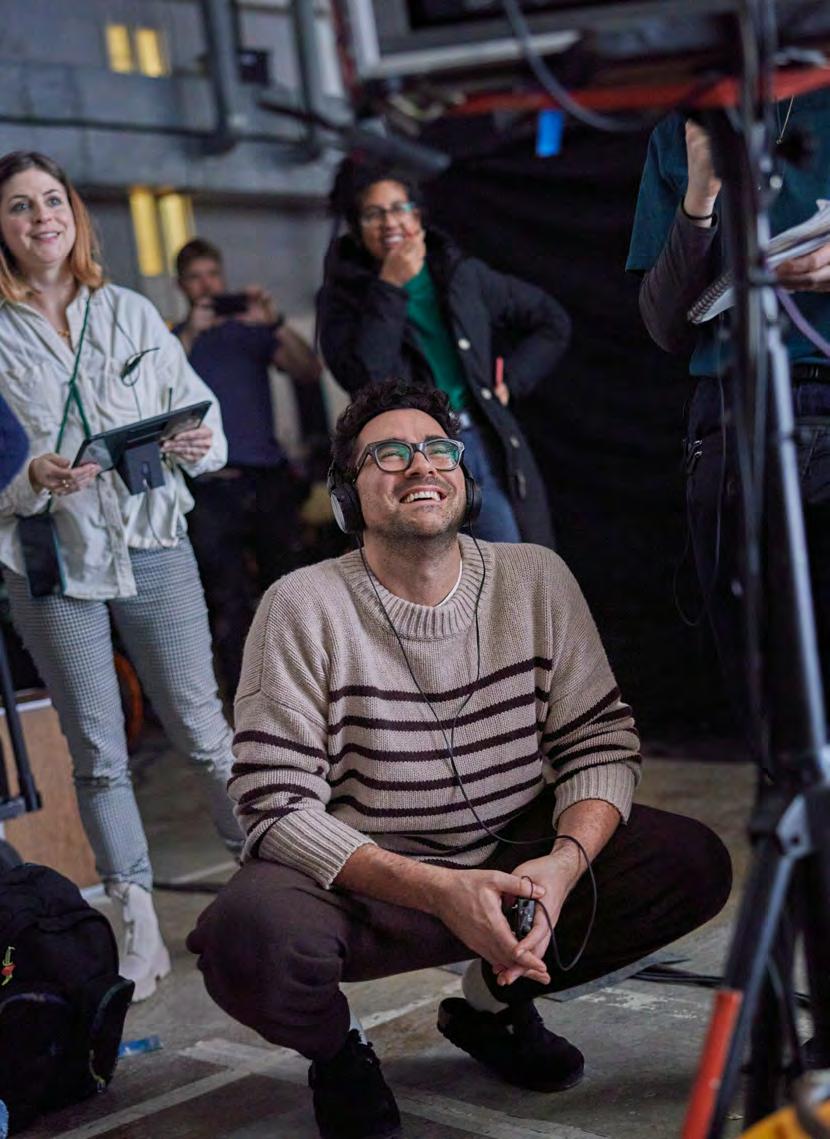
-------------------------------------------------------------------------------------------------------------------------------------------------------------------------------------------------------------------------------------------------------------------------------------------
Photo Credit: Netflix

CELEBRITY INTERVIEW
weird.
Were you even more eager to leave your house after or during the pandemic to understand what it might feel like as “Schitt’s Creek” became a success?
No. It forced me into my house even more. [Laughs.] Now it takes more to get me out of the house, to be honest. Because it’s not something that I love, frankly. I accept it because it’s part of the job, but it’s certainly not something that I’m lusting after. And so yeah, it’s been very strange. It’s been wonderful. It’s great to hear people. I think fans of the show are so generous and so kind with how they approach me and the things that they say and the comfort that the show has brought them. So I think some fandoms can be really, really intense. I think the “Schitt’s Creek” fandom community is very kind.
They have a Canadian sensibility, even though they might not be Canadian?
Exactly. We’ve somehow succeeded in just Canadianizing our wonderful fans of the show.
Did you think intentionally about how to move yourself away as an actor from David considering how iconic that character has become?
It’s a wonderful thing because there’s a real personal connection, I guess, to the character and people feeling like they know me. I’m in some ways very close to
David, and in some ways completely opposite. I think 80 episodes of doing the same character was the greatest experience, and yet you come out of it and you have a desire, as I think all actors do, to flex a different kind of muscle. And for me, I wanted to get into something a bit more dramatic. Unfortunately, given the culture of our industry, I only was receiving lesser versions of David Rose to play in other shows and movies. And so I set out to write something for myself that I thought was a challenge. It was all very guttural. It was very instinctual. I didn’t have to strategize. I tended to just listen to where my gut was telling me to go. And it was a great challenge. And as an actor, it really forced me to shake some habits that had formed over 80 episodes of playing an incredibly elastic, reactive human being. The character of Marc in this movie is so still and so calm, and shaking some of those impulses to broaden the performance was a real challenge.
But I hope for anyone who becomes identified by way of a character: We should be so lucky. There’s that. If people recognize me as David Rose for the rest of my life, let that be the case. It’s so rare that you get to participate in anything that affects people in that kind of way. But at the same time, I wish for any actor who is kind of being put in a box by way of their previous performances, that they’d be given the opportunity to show range. I think we’ve seen historically really great
comedy actors excel in drama: Robin Williams, Tom Hanks, Jim Carrey...
We have to shift this idea that if someone becomes recognizable for one thing, that that’s somehow all they can do. I love the idea of pushing actors outside of their comfort zones. And I think this movie did that with every actor, frankly, from Ruth [Negga] and Himesh [Patel] to Kaitlyn [Dever] and Emma. Everyone was playing slightly against type, which was really exciting to me.
Have you ever sent a David meme or GIF?
No. I’ve never sent a David GIF. I have sent an Alexis GIF. I think that’s as far as I’ll allow myself to go. I’m too scared of what it looks like to send a GIF of yourself. It’s the Canadian in me. I could never. It’s way too arrogant.
I have to ask you a question that everyone has been wondering: When will there be a “Schitt’s Creek” revival?
I don’t know if we’ll ever do it. You end on a high note. Listen, we as a culture want, want, want, want, want. We want it now. It’s binge culture. We want to watch an entire season of a television show in two days because that’s what we want. And yet, I think to not give people what they want is cool. And I think it forces them to return to the show. Think about all the shows that overstayed their welcome. You will never go back and rewatch episodes of
18 Fab Vegas
-------------------------------------------------------------------------------------------------------------------------------------------------------------------------------------------------------------------------------------------------------------------------------------------
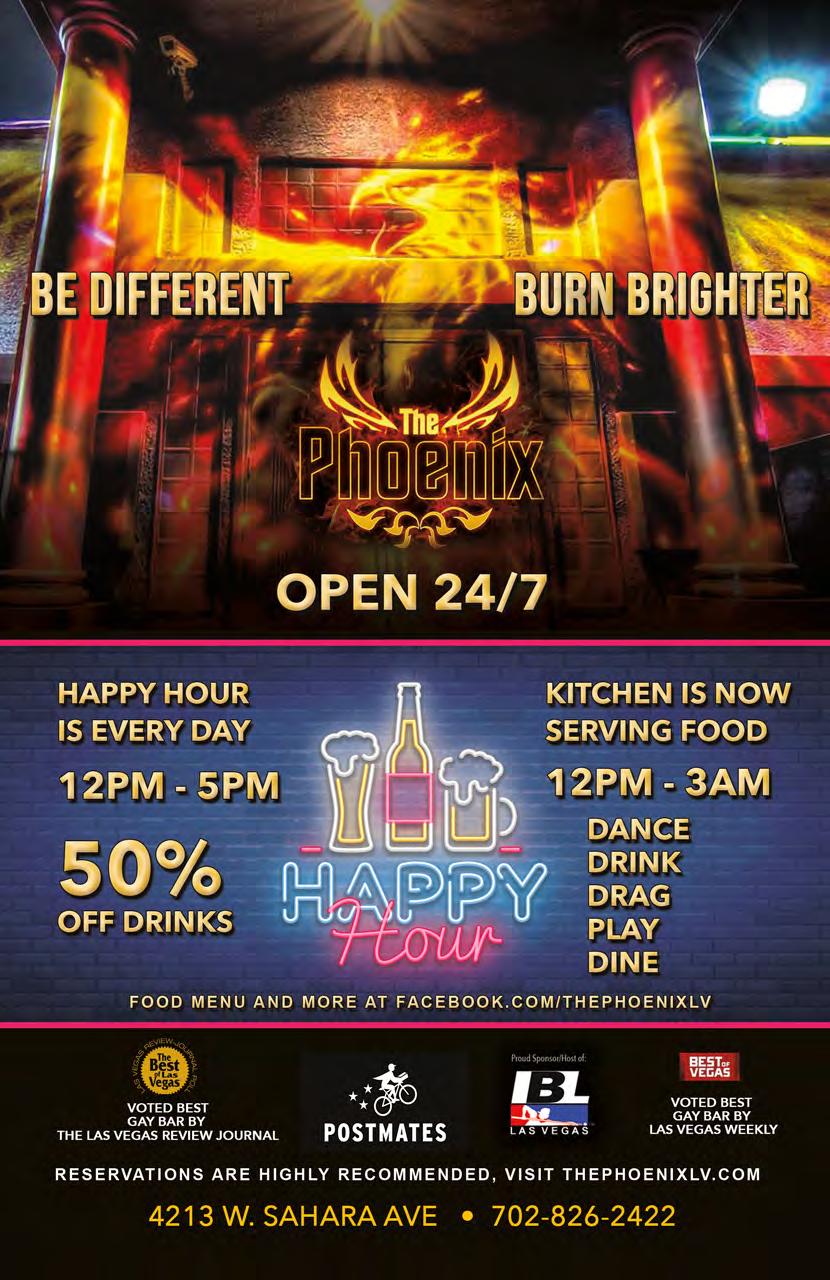
CELEBRITY INTERVIEW
those TV shows. The shows that I go back to over and over and over again are the shows that left at just the right time, and I go back because I want that feeling again.
I think we are in a culture now that’s even more critical than when “Schitt’s Creek” ended, frankly. And so I
don’t know. If I wake up one day with an idea for a movie or a Christmas special or something, and it is fucking brilliant and uses everybody to the best of their ability, and all of our actors can come back and feel excited to be there and feel like we’re doing something fresh and new,
great. That idea has not come to me, and I’m not entirely sure it will. But we will see.



20 Fab Vegas
-------------------------------------------------------------------------------------------------------------------------------------------------------------------------------------------------------------------------------------------------------------------------------------------
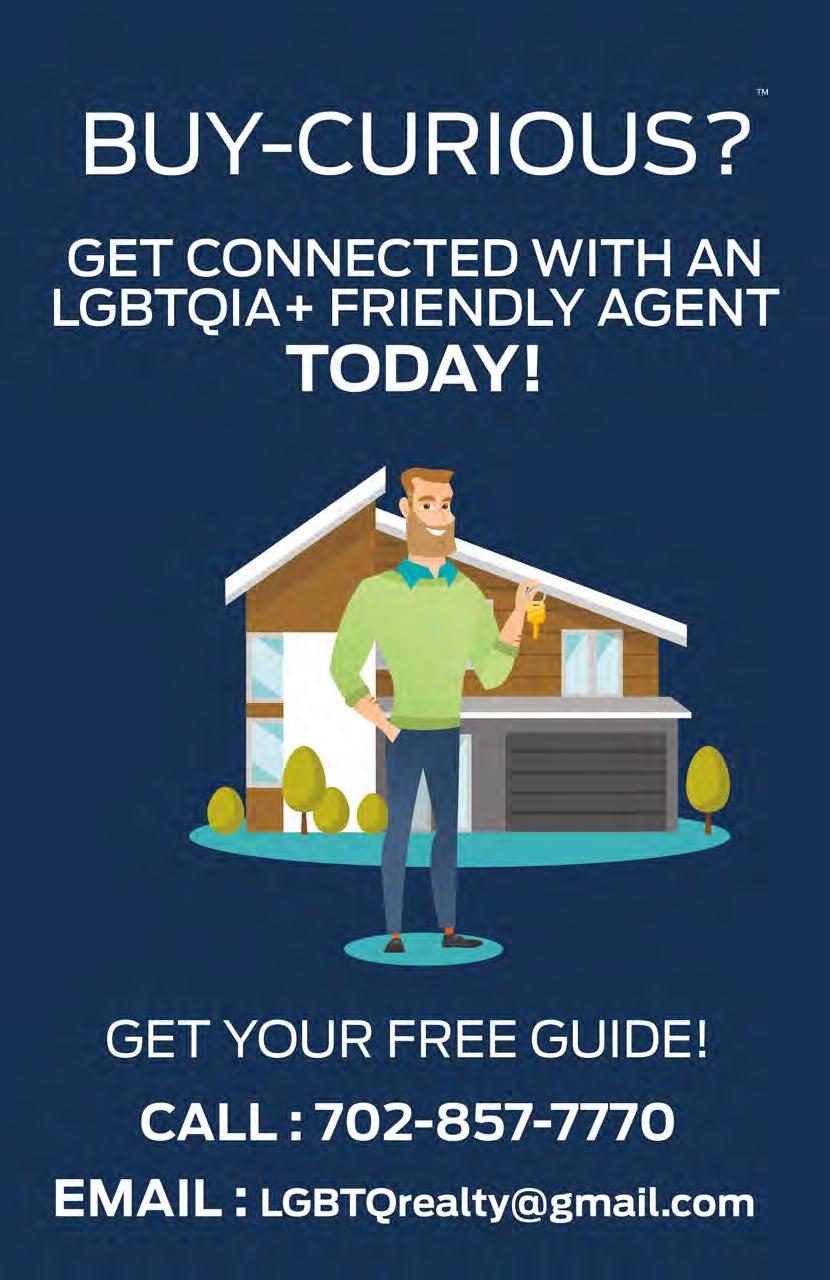
22 Fab Vegas Washington Ave evirD naru D h uoS yellaV Boulev ard yellaV a vel uoB u d a e d D o laffuB e v Washington Aven ue dniL ell d a A ertS l Roy Horn Way Washington Avenue Spring Mountain Road r a velu senoJ uoS d S dra velu o B c West Tropicana Avenue West Tropicana Avenu e South Jones u West Sahara Avenue West Twain Avenue West Desert Inn Road vrA tee e l West Oakey Boulevard Upland Boulevard D seni P yerroT N eun evA siral o P So uth C imarron R dao West Charleston Boulevard West Twain Av enue West Flamingo Road West Pennwood Ave Edna Avenue niaR dra luoB wob d ravel uoB w obni Westcliff Drive evi ogna ruD htuoS Alta Driv D o g n e riv draveluo B wobniaR htuo S e West Russell Road S T o e v D sen P yerro West Flamingo Road aveluoB utaceD V y e l l a uoB drave o S h norramiC R L oa d akeEas West Sunset pha t l a ffuB Road el evir o Riv ve Buf era falo Drive Way amiC u orn daoR n o Way Roy Horn Way htuoS b n o w veluo B a rd Raphael Rivera Way Raphael Rivera Way e a f u B u o S Raphael Rivera Way drave luoB ruta ceD Alta Drive So u c atur B rd S D h a v u o B West Hacienda Avenue South yerr o T e w e yel laV d veluoB West avel uoB taceD htuo S West n a d e u d r West Sunset Rd Sunset Road tuoS h Jo West Suns ne e s t Road Boule vard Sunset Rd Roy Horn Way Roy Horn Way Raphael Rivera Way Bu alo Ranch Spanish Hills Spring Valley Flamingo Heights Spanish Trail Lakes Gate Charleston Heights Twin Lakes Chinatown 215 95 THE PHOENIX
FabLasVegas.com 23 MCCARRAN INTERNATIONAL AIRPORT George Crockett Road P arad ise Road East S o u n r a M gni K L eluo B East St Louis Ave va S R htuo cna i r D Alta Drive East Twain Ave e ert S n w S Las Vegas Boulevard North Convention Center Dr Swenson Street y k Washingt yaw kraP aly M on Karen Avenue Karen Avenue Ave Bonanza Rd dao R ihdna S BonanzaRd Washington Ave Main Street Sunset Road htu o S joM o N troN s d a o R o M h gas Bo drave aeD M n D tra rive Spencer Street Karen Avenue n iaM htuoS Sunset Road W E Sunset Road a est e t s Wyoming Ave S v A n ammyDa Ea vis ets Junior Dri v A ve e n ret saE P e v A aradiseRd P i d a e s ank Sinatra Dr ive 4th St 4thSt East Saint Louis Avenue Highland Drive South Grand Central Parkway BonnevilleAve EClarkAve n a D n East Patrick Lane Spring M Mounta d in Roa evir d Pe cos-McLeodInterconnect P N e o co S s lli hdna Ro ad ad Pecos dao R Bonanza Road East dalay Bay Rd W n SandhillRd es daoR llihd t F Sand laming hill o Rd Road u Alta Drive K L a M o N gni e u o B hdn a S East Flamingo Road o K a v e naL enaL K East Hacienda Avenue East Hacienda Avenue s o ceP h tuoS daoR West BonnevilleAve ewS S n o s n t FremontStreet Hidde s e n Wel We l Road st Harmon Aven Dean Martin D ue Russell Road East Hacienda Avenue EAST CHARLESTON BLVD East St Louis Ave Sands Ave Dean Martin Dr Fr a n r D artaniS k Rue de Monte Carlo Main St SouthLasVegas Boulevard South Casino Center Boulevard GassAve East Saint Louis Avenue East Sahara Avenue S ahdn ill Rd Bruce St S o ceP h tuo Russel ClarkAvenue l Road est Sunset Rd Departing Flights tTwainAve DeanMartin Dr Frank ra r D South Bridge Lane Russell Rd South Rancho Drive Russell Road Man NAPLES DR WEST CHARLESTON BLVD EAST CHARLESTON BLVD EAST DESERT INN RD EASTERN AVE EASTERN AVE EASTERN AVE EAST TROPICANA AVE EAST HARMON AVE LAS VEGAS BLVD “THE STRIP” PARADISE RD PARADISE RD EAST FLAMINGO RD EAST TROPICANA AVE EAST SAHARA AVE Downtown UNLV Lakes 18b Arts District CENTER GIPSY GET BOOKED STORE PIRANHA QUADZ KUMA BATH BADLANDS SALOON ENTOURAGE BATH QUEEN LV BACKDOOR BENT INN THE GARAGE MARYS ADONIS BATH FUN HOG FLEX 15 15 515 515 15 215 THE GARDEN 95
Information for Teens: Staying Healthy and Preventing STDs
If you choose to have sex, know how to protect yourself against sexually transmitted diseases (STDs).
What are sexually transmitted diseases (STDs)?
STDs are diseases that are passed from one person to another through sexual contact. These include chlamydia, gonorrhea, genital herpes, human papillomavirus (HPV), syphilis, and HIV. Many of these STDs do not show symptoms for a long time. Even without symptoms, they can still be harmful and passed on during sex.
How are STDs spread?
You can get an STD by having vaginal, anal or oral sex with someone who has an STD. Anyone who is sexually active can get an STD. You don’t even have to “go all the way” (have anal or vaginal sex) to get an STD. This is because some STDs, like herpes and HPV, are spread by skinto-skin contact.
How common are STDs?
STDs are common, especially among young people. There are about 20 million new cases of STDs each year in the United States. About half of these infections are in people between the ages of 15 and 24. Young people are at greater risk of getting an STD for several reasons:
• Young women’s bodies are biologically more prone to STDs.
• Some young people do not get the recommended STD tests.
• Many young people are hesitant to talk openly and honestly with a doctor or nurse about their sex lives.
• Not having insurance or transportation can make it more difficult for young people to access STD testing.
• Some young people have more than one sex partner.
What can I do to protect myself?
• The surest way to protect yourself against STDs is to not have sex. That means not having any vaginal, anal, or oral sex (“abstinence”). There are many things to
consider before having sex. It’s okay to say “no” if you don’t want to have sex.
• If you do decide to have sex, you and your partner should get tested for STDs beforehand. Make sure that you and your partner use a condom from start to finish every time you have oral, anal, or vaginal sex. Know where to get condoms and how to use them correctly. It is not safe to stop using condoms unless you’ve both been tested for STDs, know your results, and are in a mutually monogamous relationship.
• Mutual monogamy means that you and your partner both agree to only have sexual contact with each other. This can help protect against STDs, as long as you’ve both been tested and know you’re STD-free.
• Before you have sex, talk with your partner about how you will prevent STDs and pregnancy. If you think you’re ready to have sex, you need to be ready to protect your body. You should also talk to your partner ahead of time about what you will and will not do sexually. Your partner should always respect your right to say no to anything that doesn’t feel right.
• Make sure you get the health care you need. Ask a doctor or nurse about STD testing and about vaccines against HPV and hepatitis B.
• Girls and young women may have extra needs to protect their reproductive health. Talk to your doctor or nurse about regular cervical cancer screening, and chlamydia and gonorrhea testing. You may also want to discuss unintended pregnancy and birth control.
• Avoid mixing alcohol and/or recreational drugs with sex. If you use alcohol and drugs, you are more likely to take risks, like not using a condom or having sex with someone you normally wouldn’t have sex with.
24 Fab Vegas
against sexually transmitted diseases (STDs).



If I get an STD, how will I know?
What are sexually transmitted diseases (STDs)?
STDs are diseases that are passed from one person to another through sexual contact. These include chlamydia, gonorrhea, genital herpes, human papillomavirus (HPV), syphilis, and HIV. Many of these STDs do not show symptoms for a long time. Even without symptoms, they can still be harmful and passed on during sex.
How are STDs spread?
Many STDs don’t cause any symptoms that you would notice. The only way to know for sure if you have an STD is to get tested. You can get an STD from having sex with someone who has no symptoms. Just like you, that person might not even know he or she has an STD.
Where can I get tested?
You can get an STD by having vaginal, anal or oral sex with someone who has an STD. Anyone who is sexually active can get an STD. You don’t even have to “go all the way” (have anal or vaginal sex) to get an STD. This is because some STDs, like herpes and HPV, are spread by skin-to-skin contact.
How common are STDs?
There are places that offer teen-friendly, confidential, and free STD tests. This means that no one has to find out you’ve been tested. Visit GetTested to find an STD testing location near you.
Can STDs be treated?
STDs are common, especially among young people. There are about 20 million new cases of STDs each year in the United States. About half of these infections are in people between the ages of 15 and 24. Young people are at greater risk of getting an STD for several reasons:
• Young women’s bodies are biologically more prone to STDs.
Your doctor can prescribe medicine to cure some STDs, like chlamydia and gonorrhea. Other STDs, like herpes, can’t be cured, but you can take medicine to help with the symptoms.
• Some young people do not get the recommended STD tests.
• Many young people are hesitant to talk openly and honestly with a doctor or nurse about their sex lives.
• Not having insurance or transportation can make it more difficult for young people to access STD testing.
• Some young people have more than one sex partner
What can I do to protect myself?
If you are ever treated for an STD, be sure to finish all of your medicine, even if you feel better before you finish it all. Ask the doctor or nurse about testing and treatment for your partner, too. You and your partner should avoid having sex until you’ve both been treated. Otherwise, you may continue to pass the STD back and forth. It is possible to get an STD again (after you’ve been treated), if you have sex with someone who has an STD.
tell your partner before you have sex. Although it may be uncomfortable to talk about your STD, open and honest conversation can help your partner make informed decisions to protect his or her health.
If I have questions, who can answer them?
• If you do decide to have sex, you and your partner should get tested for STDs beforehand. Make sure that you and your partner use a condom from start to finish every time you have oral, anal, or vaginal sex. Know where to get condoms and how to use them correctly. It is not safe to stop using condoms unless you’ve both been tested for STDs, know your results, and are in a mutually monogamous relationship.
If you have questions, talk to a parent or other trusted adult. Don’t be afraid to be open and honest with them about your concerns. If you’re ever confused or need advice, they’re the first place to start. After all, they were young once, too.
• Mutual monogamy means that you and your partner both agree to only have sexual contact with each other. This can help protect against STDs, as long as you’ve both been tested and know you’re STD-free.
Talking about sex with a parent or another adult doesn’t need to be a one-time conversation. It’s best to leave the door open for conversations in the future.
• Before you have sex, talk with your partner about how you will prevent STDs and pregnancy. If you think you’re ready to have sex, you need to be ready to protect your body. You should also talk to your partner ahead of time about what you will and will not do sexually. Your partner should always respect your right to say no to anything that doesn’t feel right.
It’s also important to talk honestly with a doctor or nurse. Ask which STD tests and vaccines they recommend for you.
• Make sure you get the health care you need. Ask a doctor or nurse about STD testing and about vaccines against HPV and hepatitis B.
Where can I get more information?
CDC
• Girls and young women may have extra needs to protect their reproductive health. Talk to your doctor or nurse about regular cervical cancer screening, and chlamydia and gonorrhea testing. You may also want to discuss unintended pregnancy and birth control.
How You Can Prevent Sexually Transmitted Diseases
www.cdc.gov/std/prevention/ Teen Pregnancy
• Avoid mixing alcohol and/or recreational drugs with sex. If you use alcohol and drugs, you are more likely to take risks, like not using a condom or having sex with someone you normally wouldn’t have sex with.
https://www.cdc.gov/ teenpregnancy/teens/ index.htm
What happens if I don’t treat an STD?
• The surest way to protect yourself against STDs is to not have sex. That means not having any vaginal, anal, or oral sex (“abstinence”). There are many things to consider before having sex. It’s okay to say “no” if you don’t want to have sex.
CS287360A
Some curable STDs can be dangerous if they aren’t treated. For example, if left untreated, chlamydia and gonorrhea can make it difficult— or even impossible—for a woman to get pregnant. You also increase your chances of getting HIV if you have an untreated STD. Some STDs, like HIV, can be fatal if left untreated.
What if my partner or I have an incurable STD?
Some STDs, like herpes and HIV, aren’t curable, but a doctor can prescribe medicine to treat the symptoms.
If you are living with an STD, it’s important to
CDC-INFO Contact Center 1-800-CDC-INFO (1-800-232-4636)
Contact wwwn.cdc.gov/dcs/ ContactUs/Form HealthFinder.gov STD Testing: Conversation Starters
https://healthfinder.gov/ HealthTopics/ Category/health-conditions-and-diseases/ hiv-and-other-stds/std-testing-conversationstarters
American Sexual Health Association Sexual Health and You
http://www.iwannaknow.org/ teens/ sexualhealth.html
FabLasVegas.com 25
STD (SEXUALLY TRASMITTED DISEASES) INFO
SEXUALLY TRANSMITTED DISEASES
INFO, TESTING & RESOURCES
WHAT IS A SEXUALLY TRANSMITTED DISEASE?
Sexually transmitted infections (STIs), also referred to as sexually transmitted diseases (STDs), are infections that are commonly spread by sexual activity, especially vaginal intercourse, anal sex and oral sex.
WHAT IS HIV?
HIV is a virus that attacks the body’s immune system.It is usually spread by anal or vaginal sex or sharing syringes with a person who has HIV. The only way to know you have HIV is to be tested. Everyone aged 13-64 should be tested at least once, and people at high risk should be tested at least once a year. Ask your doctor, or visit gettested.cdc.gov to find a testing site. Without treatment, HIV can make a person very sick or may even cause death. If you have HIV, start treatment as soon as possible to stay healthy and help protect your partners.
Nevada is the fifth highest state in the United States for rates of new HIV diagnoses and is #1 in Syphillis
*According to CDC HIV Surveillance Report, 2017 and the CDC Sexually Transmitted Disease Surveillance Report, 2017 released in 2018

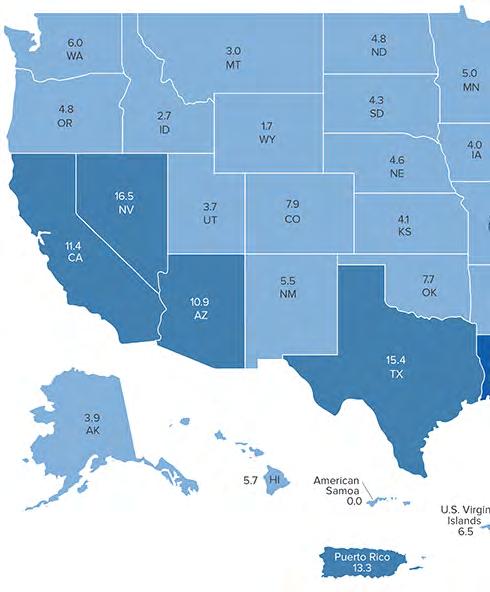

26 Fab Vegas
STD TESTING RESOURCE
SOUTHERN NEVADA HEALTH DISTRICT
ADDRESS 1: 280 S. Decatur Blvd. Las Vegas, NV 89107
HOURS: Monday – Friday 8 a.m. – 4:30 p.m. (closed 12 – 1 p.m.)
ADDRESS 2: 4201 W. Washington Ave. Las Vegas, NV 89107
HOURS: Monday – Wednesday 9 a.m. – 2:00 p.m.
The following services are offered at the Sexual Health Clinic:
1. Diagnosis and treatment of active or suspected cases of:
• Chlamydia
• Gonorrhea
• Syphilis
• HIV
• Trichomonas (females only)
• Bacterial Vaginosis (females only)
2. Free condoms and instruction on how to safely use them (both male and female condom)
3. Follow-up bloodwork
4. Hepatitis screening, diagnosis and treatment
5. High-risk behavior counseling
6. HIV Nursing Case Management
7. Injection series for syphilis medication
8. Partner notification
9. Referrals by private physicians
10. Sexual assault follow-up
11. Test results and couseling
Clients seeking treatment at the Sexual Health Clinic should know that the Health District is required to report cases involving assault or abuse to appropriate agencies.
HIV Testing: HIV antibody testing is a simple blood test performed by a trained professional. This procedure is strictly confidential. Counseling regarding the meaning of the test and its result take place before the actual testing to ensure you understand HIV infection and the testing procedure.
HIV testing procedure: Blood Test – Blood drawn from a vein is tested for HIV antibodies. This test is available at the Sexual Health Clinic (280 S. Decatur Blvd. Las Vegas, NV 89107 ), Monday through Friday 8 a.m. to 4 p.m. Please call (702) 759-0702 for more information.
If you have questions, contact the clinic by phone at (702) 759-0702 or by email at SexualHealth@snhd.org
FabLasVegas.com 27
PRIDE FLAGS
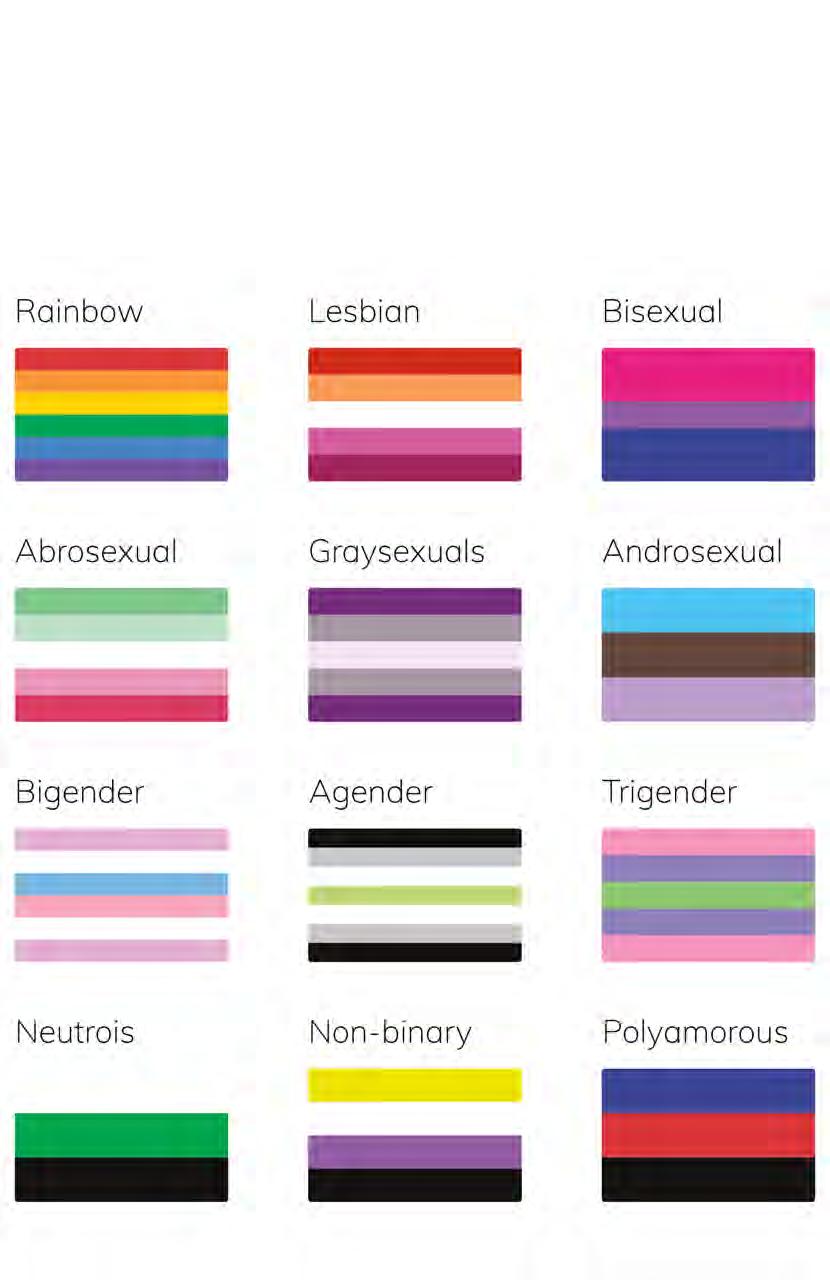

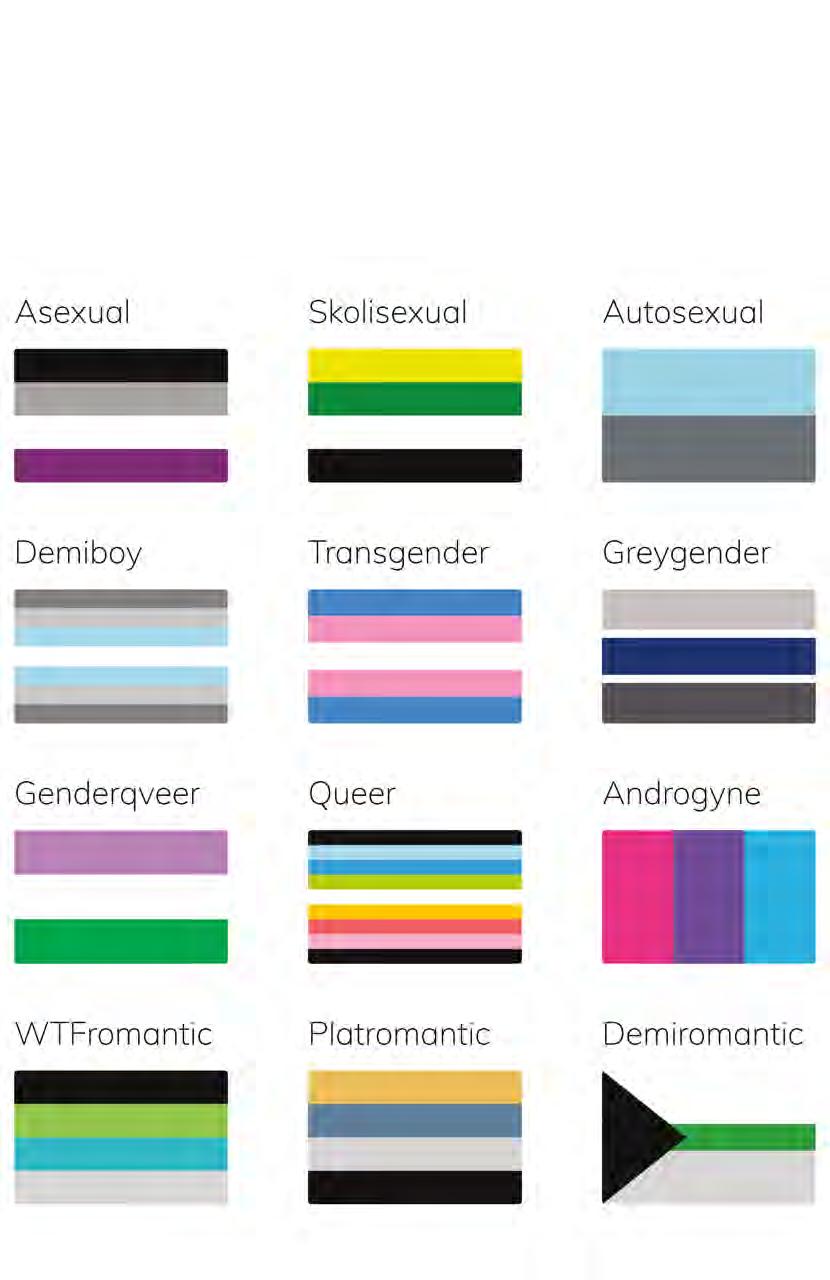

PRIDE FLAGS





COMMUNITY RESOURCES
32 Fab Vegas






















FabLasVegas.com 33
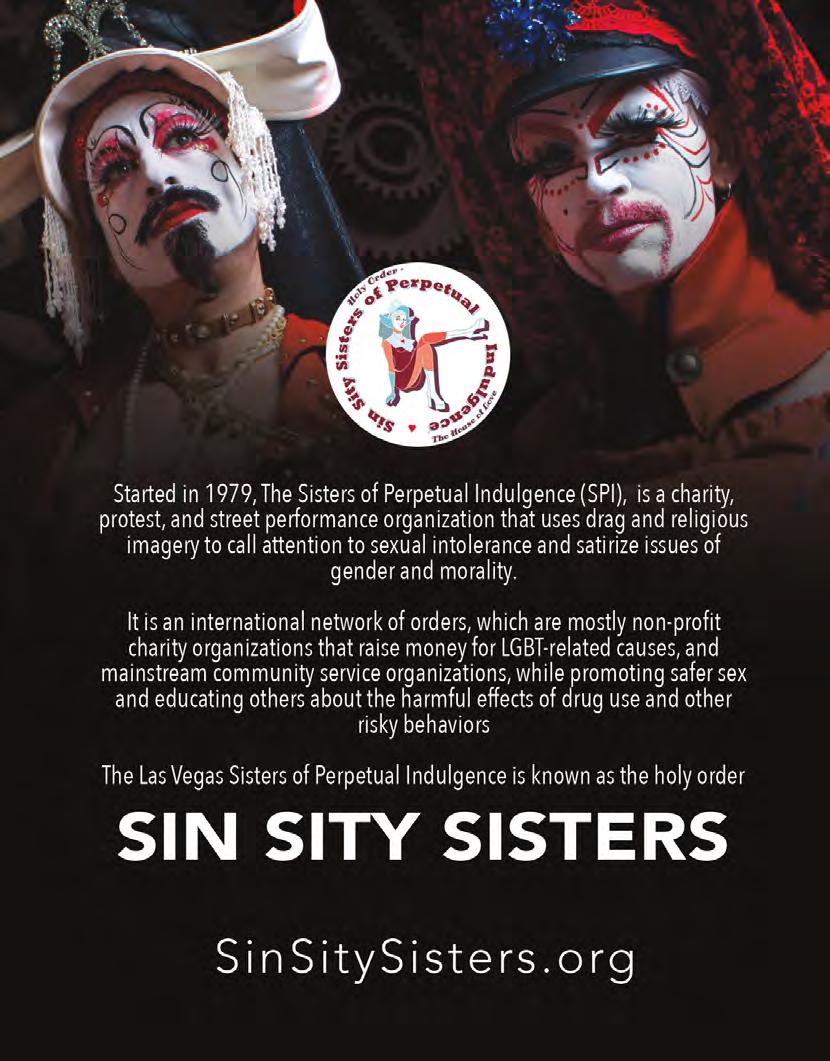
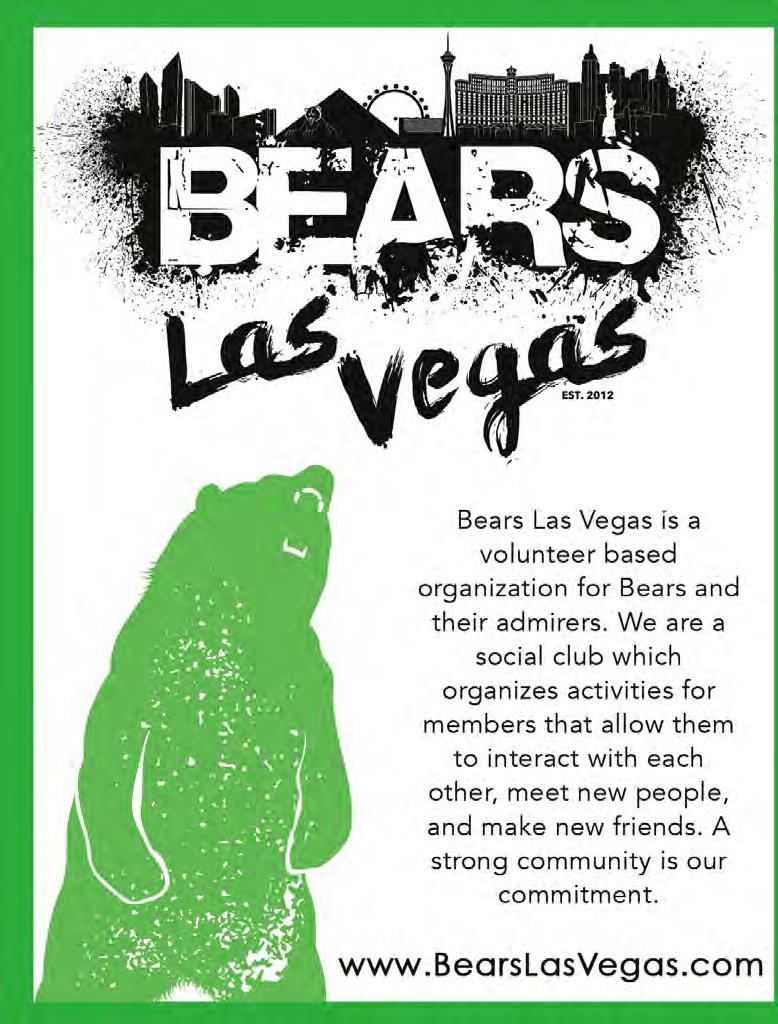






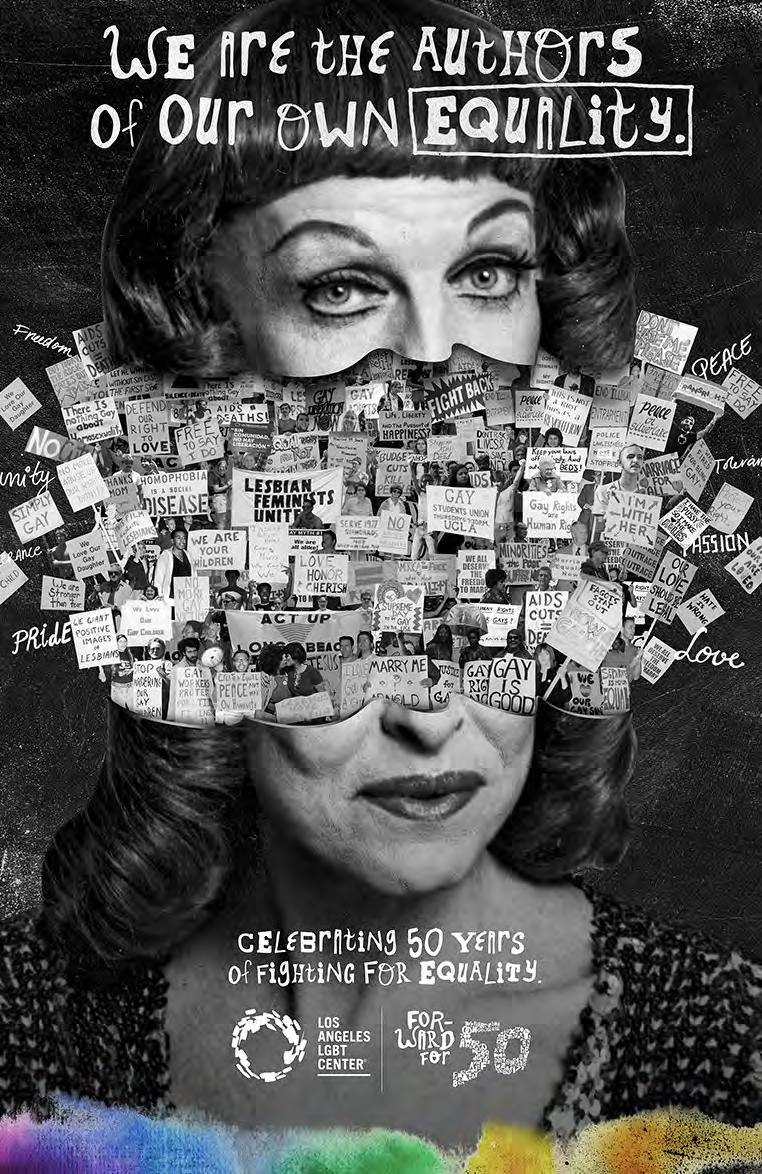
www.afanlv.org Aid for AIDS of Nevada (AFAN) provides support and advocacy for adults and children living with and affected by HIV/AIDS in Southern Nevada. AFAN works to reduce HIV infection through prevention and education to eliminate fear, prejudice and the stigma associated with the disease.
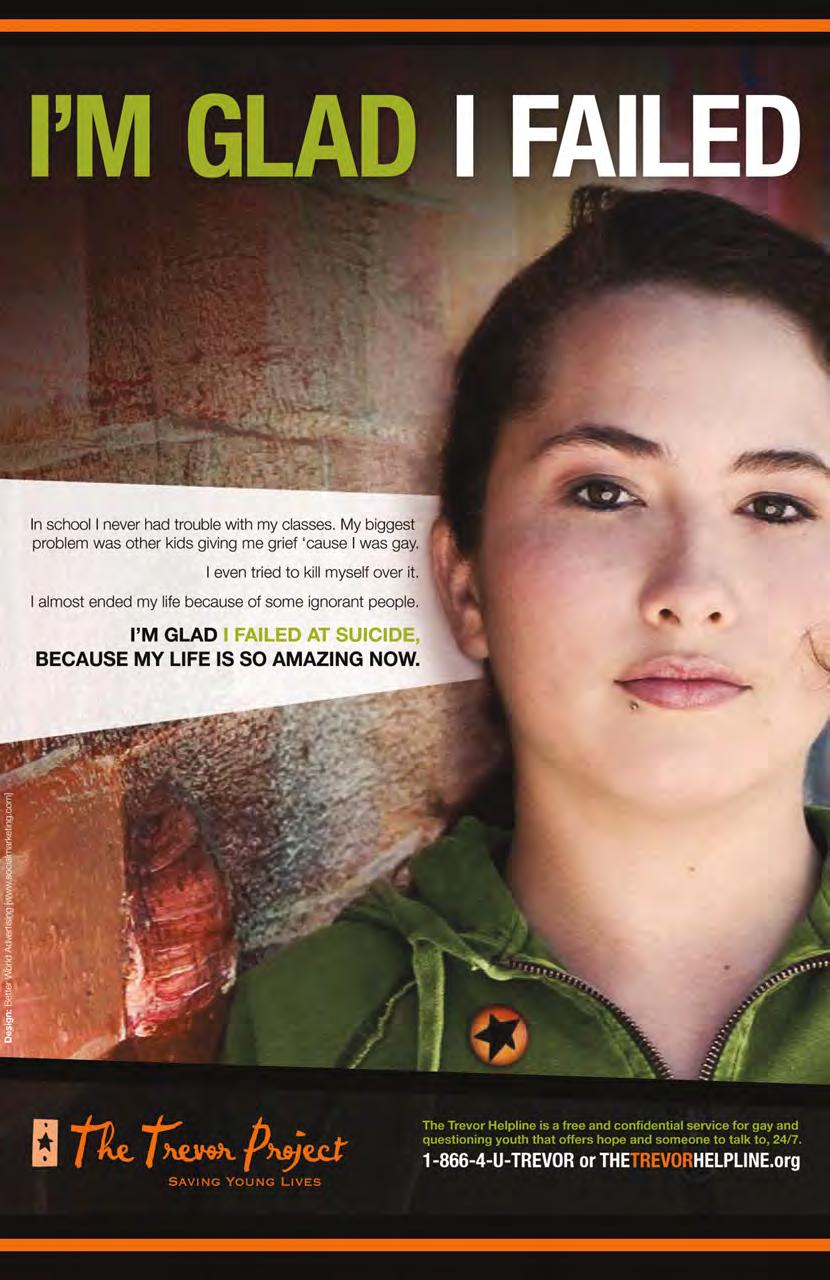

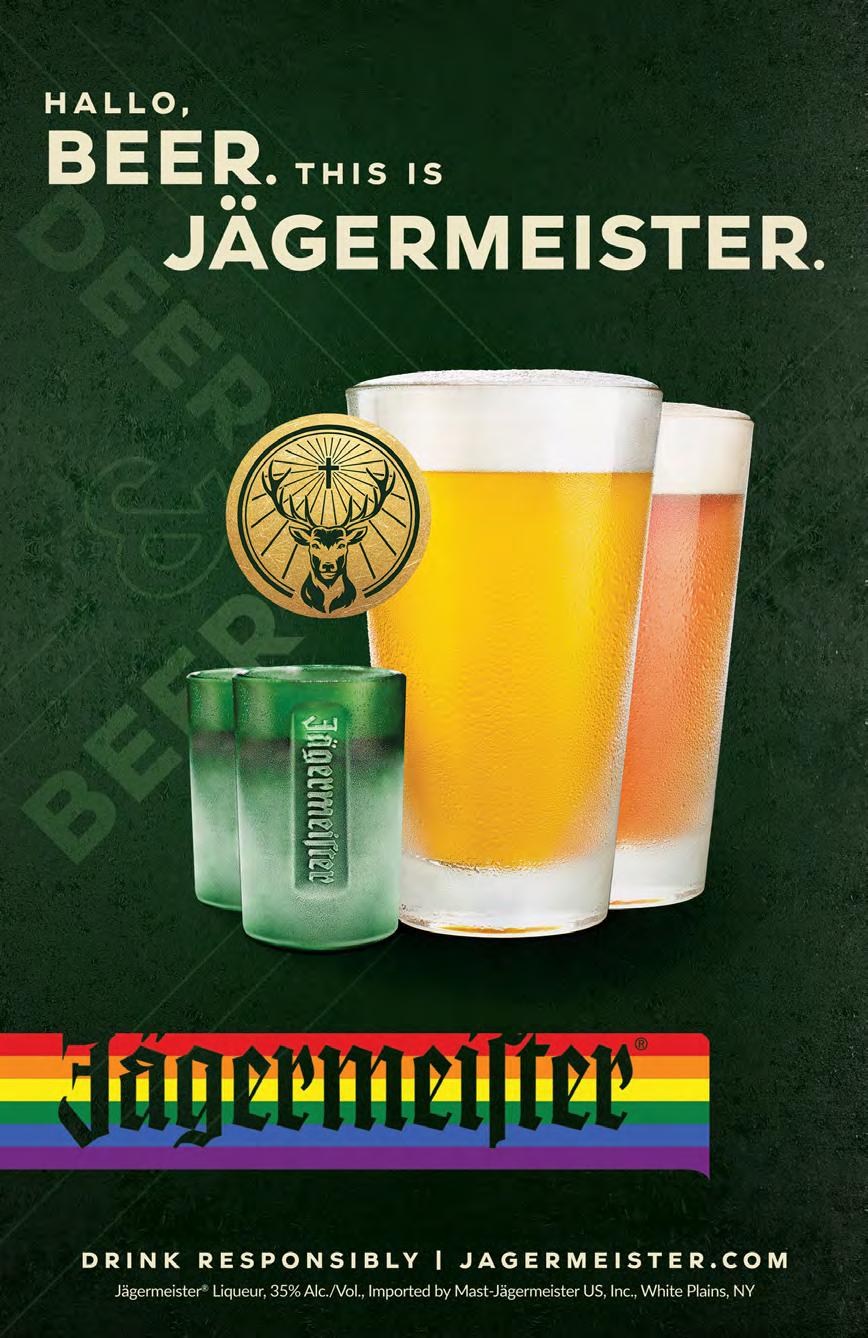
BELLA, BELLA, BELLAGIO
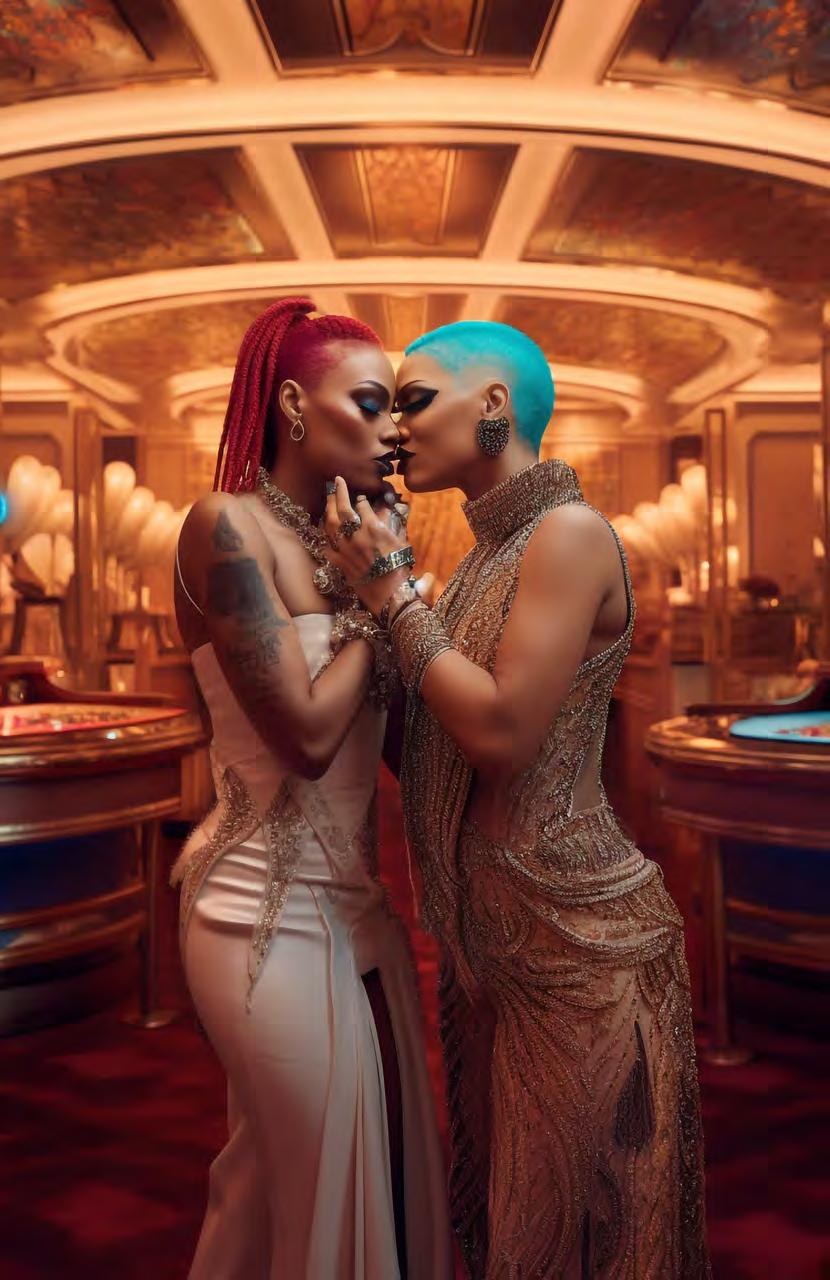
FOLLOW THE RAINBOW ™

































































